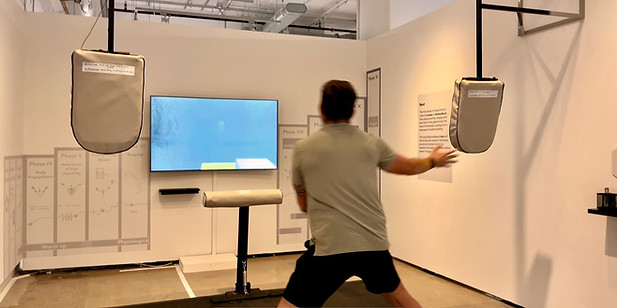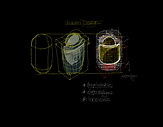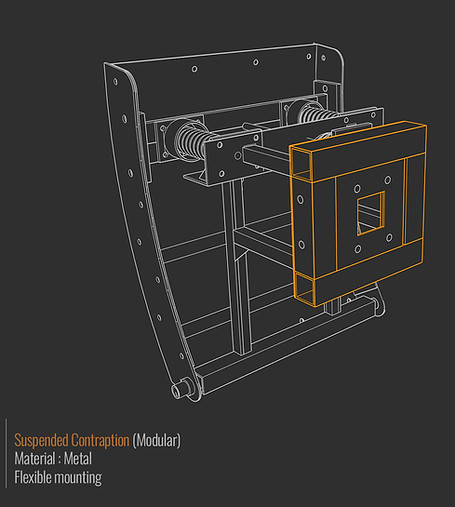
A Phy-gital Interactive Game for Emotion Elicitation and Cognitive Shifts
Aik-Naad

Derived from the hindi word meaning 'Unison' or 'one rhythm'

Epitomizes the philosophy if harmony and transformation
Where the state of unison itself is the creator or enabler of the dance
Dance of the explosive synergy of physical exertion and emotional intensity
An Experiment
A Safe Space
A Conduit

"Susan says, don't get
afraid, get angry!"
- Terry Pratchett
Designed to elicit the sweet spot of
'Constructive Anger'
*Not Rage, not violence, but raw intuitive force that fuels creativity and deep focus
Game Design
5x Input Modalities
How
Neuroscience
Sports & Frustration
Psycho-Physiology
Context
Body
Game Interaction
Audio
Public Spectatorship
Upending Outside - in Affect Model
to
Inside - Out
Model
Beginning with elevated biomarkers
body initiates affect - not in response, but in advance
Application of
Dr Lisa Feldman Barrett's
Theory of
Constructed
Emotions
Interaction +

Back Suspended Pads | Game Mechanisms

Grounded Front Hammer | Game Mechanisms
01
02

1
2
3
-
Push Mechanics
-
2x Pressure sensitivity
Medium Push
Moderate forward Boosts
Big Push
Critical in high-resistance scenarios.
-
Directional + Rotationa Control
-
3x Pressure sensitivity
Light Touch + Medium Hit Directional precise maneuvers
Big Hit
Rotational Adjustments : 25 - 180° ratation
Custom Game Controller
3x Interaction Points
High Resistance
20° Follow Through
Contraction of core muscles
-
Triangulated movement
-
Release of IL-6
-
Sensor embedded
-
FSR + Accelerometer

Game Design+





Environment Design
-
Built for affect neutrality with subtle tension
-
Progressively intensifies through light, scale, and sound
-
Designed for intuitive navigation without instructions
-
Spatial shifts align with emotional escalation
-
Each zone supports a phase in player's journey





Character Design
-
Non Human form for open emotional projection
-
Simplified shape avoids identity bias or distraction
-
Visual changes (Spring anchor strength) reflect health without HUD
-
Feels both fragile and resilient - just like the player





Level Design
-
Structured in 10 phases of varying intensity
-
Players learn mechanics through doing- no tutorials
-
Healing points provide strategic moments of recovery.
-
Balance of chaos and control for immersive engagement
-
Traps, and pace shits build emotional stakes
Reception +
01
High Kicks
Despite not being designed for it, the suspended contraptions prompted spontaneous high kicks and full-body engagement. This unexpected movement spoke to how urgency and instinct can override instruction, turning the space into a site of embodied improvisation — exactly the kind of active architectural response Aiknaad aims to provoke.

02
Maneuvering with a broken arm
A participant with a broken arm reinterpreted the gameplay entirely, recruiting nearby friends into a collaborative navigation effort. This moment revealed the system’s adaptive social elasticity, highlighting how constraint in one body can lead to collective strategies, and reframing the game as a shared experience.

03
Standing Still
Not every participant played actively — some stood in silence, simply observing or slowly touching the rotating capsule. These quiet interactions revealed the meditative, even hypnotic quality of the space. The absence of movement became a mode of engagement itself, underscoring the project’s layered pacing and tension

04
Emotional Reflections on cork board
Visitors left handwritten testimonials, revealing how the experience resonated beyond gameplay. From notes on frustration, catharsis, exhaustion, and joy, the reflections captured the emotional spectrum Aiknaad evoked. The corkboard became a site of shared vulnerability, documenting how each player constructed meaning in their own way.

Third
Iteration +



- Modular and refined build
- Adaptability
- Multi-context deployment
- Strengthen physical engagement
- Streamlining setup and testing

Progression




EEG
Integration +
Aik-Naad as
Meta System
Current research involved EEG input, positioning Aik-naad as a meta system - one that maps brain - body - environment interactions without intervention, offering new ways to observe not only to observe constructed psycho-physiological coupling but also design for variations within subset of an emotion.










